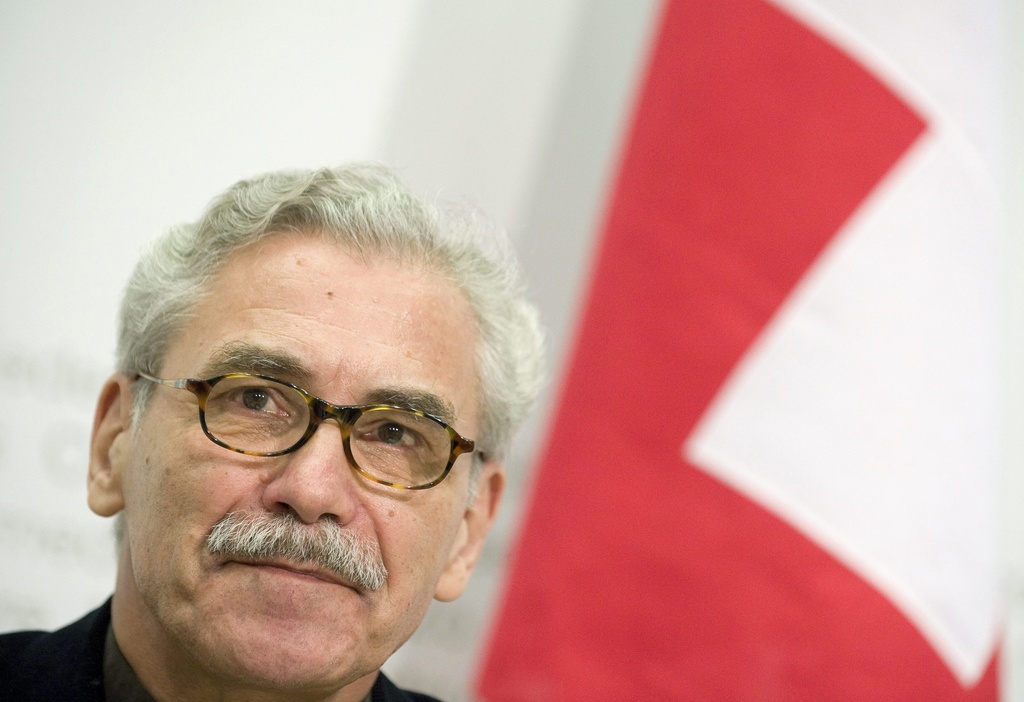
Unconditional income could pave way for future
The introduction of an unconditional basic income is the solution to the problems caused by de-industrialisation and digitalisation of our work, something our current welfare state has no answer to, says Oswald Sigg, one of the main members of the initiative committee.
According to the former Swiss government spokesman, a micro tax levied on money transactions could help finance such an unconditional income and be welcome.

A “yes” vote to the initiative for an unconditional basic income would pave the way to the future of our work-oriented society. Let’s go beyond the Swiss borders and look at Europe: paid work is decreasing everywhere.
More than 30 million people are unemployed within the European Union economic space, and the tendency is rising.
The constant fight for jobs and the continuous need to increase the efficiency of companies and administrations have dramatic consequences for employees in the industrial as well as in the services sectors.
The number of sick days among employees has been on the rise everywhere. A survey conducted in 2010 showed that Germany alone was expecting around €225 million (CHF247 million) in costs incurred by the lack of added value creation per year, and the tendency is rising.
In Switzerland, both de-industrialisation and digitalisation are progressing fast.
However, Swiss people work hard, and they sometimes do so without getting remunerated: 50% of the working hours in our society are unpaid. This applies to family and housework as well as to the care and nursing sectors.

More
Unconditional basic income: a risky gamble
Thousands of working hours for non-profit organisations, foundations, local and cantonal authorities also remain unpaid. The same goes for a lot of creative work done by artists. Moreover, many working poor, unable to finance a normal life with their salaries, live close to the poverty line.
Switzerland is not only a working, but also a social community.
Every legal resident in a precarious situation has the right to receive a conditional basic income.
“In times of emergency, every person has a right to shelter, medical care as well as the necessary means to lead a human life.” This is along the lines of what is enshrined in the constitution of canton Bern for instance. But in reality, these promises look very different.
It is said that about 50% of the people in Switzerland entitled to social welfare don’t claim the money.
Those who cannot make ends meet, and whose salary is too low live below the poverty line often avoid seeking financial assistance from their social welfare office of their community. And why?
Because they are looked at suspiciously for being potential frauds; because they are often despised, ostracised and according to Swiss law they are put at the same footing as criminals. As if getting social welfare were a matter to be dealt with by the criminal code.
Is Switzerland a developed social welfare state? Are social security, justice and compensation guaranteed here?
Not really. Even if the preamble of our constitution assures that only “those making use of their freedom are actually free, and the power of the people is measured on the wealth of the weak”.

More
A basic income for all – the issue before Swiss voters
If an unconditional income, which would probably cost more than CHF200 billion ($208 billion) annually, were to replace the current old age pension scheme, it is essential to look at ways of financing it. We would need a new tax, which would eventually replace some of the existing taxes that could then be abolished.
According to an idea by the Zurich financial enterprise Felix Bolliger, all money transactions should be taxed.
Over the past few years, these transactions have been worth more than CHF100,000 billion. More than 90% of all financial transactions take place within the financial sector, or rather the ‘financial casino’.
An automatic micro tax on money transactions would only yield two parts per thousand of each payment, which would then go towards financing the basic income. We would all be taxed on our daily payments on a small scale.
However, those who play with millions and billions every single day would have to carry the main burden. Only if we introduce an unconditional income that is collectively financed, can we become a true social welfare state.
The views expressed in this article are solely those of the author, and do not necessarily reflect the views of swissinfo.ch.
Opinion series
swissinfo.ch publishes op-ed articles by contributors writing on a wide range of topics – Swiss issues or those that impact Switzerland. The selection of articles presents a diversity of opinions designed to enrich the debate on the issues discussed.
Translated from German by Billi Bierling

In compliance with the JTI standards
More: SWI swissinfo.ch certified by the Journalism Trust Initiative





























You can find an overview of ongoing debates with our journalists here . Please join us!
If you want to start a conversation about a topic raised in this article or want to report factual errors, email us at english@swissinfo.ch.